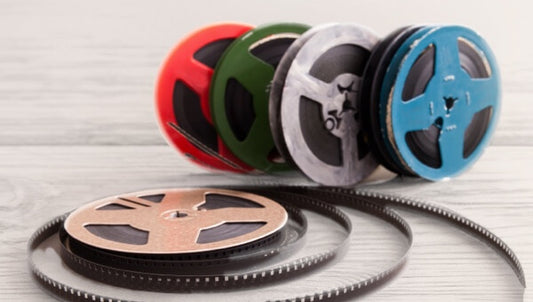Starting in the late 1970s and accelerating into the 80s, Betamax and VHS tapes had an all-out war. While Betamax offered higher resolution, longer runtime, and a smaller design, VHS tape ended up winning the videotape format war for several reasons.
Capture archival experts have compiled all the information you’ll ever need to know about the format war so you can look back at your VHS and Beta tapes with an understanding of the nostalgic memories they contain. Plus, it will help you see how the format war propelled home movie popularity into the digital age.
Keep reading to learn about the history of Beta vs. VHS, the differences between the two popular formats, the factors of the format war, and the outcome that left VHS as the reigning videotape champion.
Jump to:
-> Differences between VHS and Betamax
-> Marketing and Industry Factors in the VHS vs Betamax War
-> Cultural Factors in the VHS vs Betamax War
-> The Outcome of the VHS vs Betamax War
History of VHS and Betamax

The history of both VHS and Betamax formats begins in 1969 when the U-Matic analog video cassette format was first developed by Sony, Matsushita (Panasonic), JVC, and five non-Japanese companies. While the U-Matic failed as a home movie format because it was expensive to produce, the production jumpstarted the technology that paved the way for the other formats that you know and love.
In 1975, Sony introduced the Betamax video cassette recorder format (VCR) first in Japan and then in the United States a few months later. This was the first time a VCR system was available for home entertainment because it was affordable for many families. The technology lasted until Sony finally discontinued Betamax production in 2002 after formats like DVD and Blu-Ray became wildly popular.
VHS was a later format that was released by JVC in 1977. If you’re wondering, “what does VHS stand for?”, it means Video Home System. VHS tapes offered similar benefits like affordability, convenience, and higher quality than preceding film formats. They even looked similar to Beta tapes because both videotape formats use magnetic tape encased in a usually black cassette.
With both formats being so similar with a few differences in resolution, run-time, and manufacturer, the format war officially began. With a two-year head-start, more compact design, and slightly higher resolution, Betamax had an initial advantage over VHS tapes. However, throughout the 1980s various cultural and marketing factors influenced the outcome and eventually made VHS format the clear-cut winner.
Differences between VHS and Betamax

Before we examine the factors that affected the outcome of the format war between Betamax vs. VHS, it’s important to look at the differences and similarities between the two technologies including image quality, playback capacity, tape size, and manufacturer.
Image Quality
The picture quality between Sony Betamax and JVC’s VHS is comparable, but Beta tapes offer a slightly better picture. While VHS offers a video quality of 320 x 486, Betamax format offers a resolution of 333 x 486. This means that Betamax was better because of its higher horizontal resolution than VHS cassettes.
Capacity
Betamax tapes offer up to 5 hours of playtime while VHS tapes in standard play mode offer up to 2.66 hours of recording time. However, there are some other considerations because there are several types of VHS tapes like VHS-C, S-VHS, and S-VHS-C, which offer different capacities. In general, though, VHS tapes offer around 2 to 3 hours of playtime with longer recording time available in some circumstances.
Tape Size
Standard VHS tapes are 7.3 inches long and 3.75 inches wide whereas Beta tapes are 6.2 inches long and 3.75 inches wide. Since Betamax is smaller and more compact, it makes recording and storage easier. VHS-C was an alternative compact VHS tape with dimensions of 3⅔ × 2¼ × ¾ inches that was released in 1982 during the format wars. However, VHS-C tapes require an adapter to play on a VHS VCR system.
Manufacturer
As mentioned earlier, Sony released Betamax while JVC developed VHS tapes. Sony continued to produce Betamax tapes on their own (although Betamax machines were produced by other companies like Sanyo). Conversely, JVC decided to allow other companies to make and sell VHS tapes, which meant there were many manufacturers of both VHS tapes and VHS players. This decision played a major role in the outcome of the format wars.
Marketing and Industry Factors in the VHS vs Betamax War

The way Beta tape vs VHS tape formats were marketed was very influential in the format war. This includes the initial marketing strategy, availability of content, price, and role of third-party manufacturers.
Marketing Strategies of VHS and Betamax Manufacturers
Sony invented Betamax and wanted to retain control of all profits for the development of the ground-breaking videotape format, but that’s exactly what attributed to the decline in Beta vs VHS because it meant that anybody who wanted to use a Betamax tape had to pay the premium price of buying through Sony.
On the other hand, JVC shared their invention with the rest of the world and allowed other manufacturers like RCA and Matsushita to produce VHS tapes. Because of this, even though Betamax tapes offered better picture quality, VHS tapes were more affordable and available.
Availability of Content on Each Format
Since JVC approached other companies to produce VHS tapes, they were able to accelerate availability compared to their rival Betamax. With this availability came the prevalence of VCR systems that didn’t offer Beta compatibility. It didn’t take long for motion picture companies to begin producing movies in VHS format and completely abandon Betamax simply because VHS was more available and widely used.
Prices of VHS and Betamax Equipment and Tapes
When JVC decided to allow other manufacturers in the late 1970s, they drastically brought down the price of VHS tapes and equipment. By 1984, there were over 70 VCR manufacturers, which meant VHS VCR systems cost between $200 and $400, hundreds of dollars less than Betamax players that cost as much as $2000 or more. When given a choice between slightly better quality and significantly lower cost, it turns out most people chose the cheaper option.
Cultural Factors in the VHS vs Betamax War

While the marketing strategy and prices were the eventual downfall of Betamax tapes, some cultural factors also influenced the outcome of the format wars.
According to Wikipedia, some sources claim that VHS won because of the greater availability of adult films when compared to Betamax. Adult film companies even pushed for VHS use over Betamax because it was more available worldwide.
In addition, tech enthusiasts often preferred VHS tapes despite the slightly lower resolution. This is because there was a larger choice of different hardware like VHS cameras, VHS machines, and cassettes, which meant more to try.
Finally, while many video rental stores offered both VHS and Betamax tapes during the early and mid-1980s, they began to phase out Betamax selections because of the widespread use and availability of the VHS tape format. While Betamax remained in use within professional broadcasting, it was clear that the availability and affordability of VHS vs. Beta would be the eventual deciding factor in the format wars.
The Outcome of the VHS vs Betamax War

VHS developed into the clear winner of the format war. That’s why VHS cassette tapes were used for Hollywood movies, in the home video market, and as the most popular format for video recording systems that recorded countless memories, football games, television shows, and much more.
It didn’t take long either with VHS controlling 60% of the North American market share by 1980 and continuing to rise throughout the next few years. While many cultural and marketing factors influenced this outcome, the main reason that VHS was so successful was the availability due to multiple manufacturers. This not only made it easier to find and get VHS cameras, tapes, and VCRs, but also made them much more affordable.
Both Betamax and VHS tapes had a major impact on home entertainment and home movies today. Before these formats, film, and projectors were the only way to capture and view memories. Video tape formats made it more convenient to film family gatherings, weddings, graduations, and daily life.
They also bridged the gap into digital formats like DVD, Blu-Ray, and flash drives. This legacy lives on in our videotape memories as well, with old VHS and Betamax tapes still containing our old home movies from the 70s, 80s, 90s, and early 2000s.
Conclusion

The VHS vs. Beta format wars of the late 1970s and 1980s began as a rivalry between Sony and JVC. While Sony retained control of their Betamax format, JVC shared the VHS format, which made it more available and affordable. This was one of the deciding factors in the format war that left VHS as the clear victor.
The same factors of affordability versus higher quality affected the outcome of the DVD vs. Blu-Ray war decades later. This just shows that people love having affordable and readily available options, even if it means that the quality is slightly lower.
Fortunately, Capture offers a combination of high-quality outcomes and affordable options to convert your videotapes into digital format, whether you have Betamax or VHS format. We can make sure your memories last forever for future generations to enjoy. Click here to learn more about Capture videotape transfer services.











